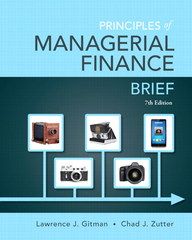Question
#1. An investor has two bonds in his portfolio that have a face value of $1,000 and pay a 9% annual coupon. Bond L matures
#1. An investor has two bonds in his portfolio that have a face value of $1,000 and pay a 9% annual coupon. Bond L matures in 10 years, while Bond S matures in 1 year.
- What will the value of the Bond L be if the going interest rate is 5%, 7%, and 10%? Assume that only one more interest payment is to be made on Bond S at its maturity and that 10 more payments are to be made on Bond L. Round your answers to the nearest cent.
5% 7% 10% Bond L $ $ $ Bond S $ $ $
#2. An investor has two bonds in her portfolio, Bond C and Bond Z. Each bond matures in 4 years, has a face value of $1,000, and has a yield to maturity of 9.1%. Bond C pays a 10.5% annual coupon, while Bond Z is a zero-coupon bond.
- Assuming that the yield to maturity of each bond remains at 9.1% over the next 4 years, calculate the price of the bonds at each of the following years to maturity. Round your answers to the nearest cent.
Years to Maturity Price of Bond C Price of Bond Z 4 $ Answer $ Answer 3 $ Answer $ Answer 2 $ Answer $ Answer 1 $ Answer $ Answer 0 $ Answer $ Answer
#3. Six years ago the Templeton Company issued 15-year bonds with a 14% annual coupon rate at their $1,000 par value. The bonds had a 9% call premium, with 5 years of call protection. Today Templeton called the bonds. Compute the realized rate of return for an investor who purchased the bonds when they were issued and held them until they were called. Round your answer to two decimal places.
_______%
Step by Step Solution
There are 3 Steps involved in it
Step: 1

Get Instant Access to Expert-Tailored Solutions
See step-by-step solutions with expert insights and AI powered tools for academic success
Step: 2

Step: 3

Ace Your Homework with AI
Get the answers you need in no time with our AI-driven, step-by-step assistance
Get Started


